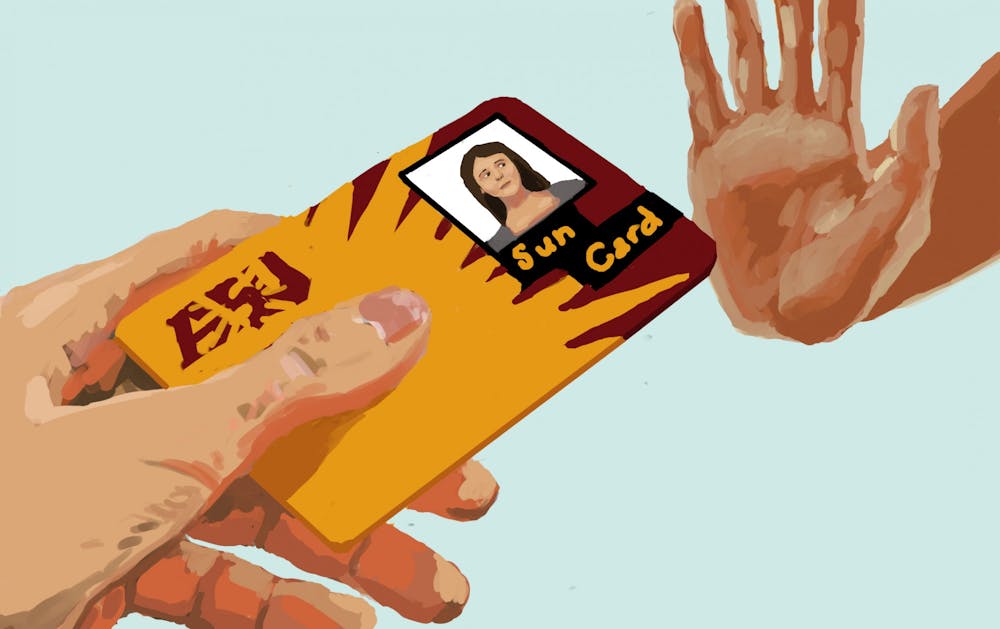Rep. Kelly Townsend (R-Mesa) and Rep. Bob Thorpe (R-Flagstaff) have both proposed voter registration bills that would impact student voting if enacted.
Townsend's House Bill 2043 would prohibit voters from using either college or high school student IDs as a form of valid ID for elections.
Thorpe's HB 2461 would prevent voters from registering with an address of a college dormitory or an address where they do not intend to live for 12 months out of the year.
HB 2043: Voting with a student ID
Townsend's bill would define acceptable forms of IDs as a voter registration card or a valid United States federal, state or local government-issued identification, and prohibit the use of a high school or college ID to receive a ballot.
The legislation would also prohibit utility bills, credit card statements, Arizona vehicle registration or a vehicle insurance card as acceptable proof of name and residence.
Julian Lehrer, president of Young Democrats at ASU, said the legislation appears to be meant to prevent students from voting.
"On the surface it seems like a clear attempt to suppress the voting rights of both high school and college students," Lehrer, a senior studying political science, said.
Lehrer said school IDs are an accessible form of identification and preventing the use of them leaves some voters without options.
"Not all college or high school students might have an ID readily available, and if they register to vote and they present a school ID I think that should be sufficient in order to be able to vote," Lehrer said.
Joe Pitts, the vice president of College Republicans at ASU, hoped for more clarification on why the legislation was being presented but did not appear to agree with Lehrer's assessment.
"Making sure that citizens who have a legal right to vote, can vote, isn’t voter suppression," Pitts, a freshman studying business law, said. "Making sure you have to present an ID at a polling place isn’t voter suppression."
Jessica Carter, the treasurer of Young Democratic Socialists of America at ASU, was skeptical about the intent of the legislation.
"This is definitely something that’s going to be disproportionately affecting lower-income students," Carter, a junior studying history and justice studies, said.
"ASU gives you a free ID, you have to provide proof of who you are in order to get that ID," Carter said. "It’s similar standards to how you would get a driver's license."
The legislation faces opposition from the American Civil Liberties Union.
Townsend did not respond to requests for comment.
HB 2461: Dorms as residency
Thorpe's bill would also impact student voters but during their registration instead of at the polls.
HB 2461 would prevent voters from registering in Arizona with the address of a dormitory or an address where they do not intend to live 12 months out of the year.
Orion DiFranco, sophomore political science major and secretary of Young Democrats at ASU, said the organization strongly disagrees with the proposed legislation.
"We are entirely opposed to this legislation," DiFranco said. "It’s nothing more than an attempt by politicians who don’t really appreciate the way that a majority of students vote to suppress that turnout."
DiFranco said college students meaningfully participate in the community where they attend school and therefore should have a political voice in the state.
"College students not only live around the school but also work and shop and contribute to the local community in many other ways and therefore should have just as much of a right to have their voice heard in our democracy as any other member of the community," DiFranco said.
An analysis from AZCentral of voter registration records showed that over 2,000 registered voters had listed ASU-owned dormitories as their address. The analysis showed that this change would affect thousands of college students statewide and disproportionately affects democratic voters.
Pitts said although College Republicans does not have an official stance on the bill, the group was happy that the session's first bill signed by Gov. Doug Ducey was a bipartisan effort toward election integrity.
"We hope that any elections bills or anything having to do with voter registration, is regarding voter integrity, not anything that could be construed as voter suppression," Pitts said. "I don't think anyone actually supports something like that."
Thorpe did not respond to requests for comment.
The future of the changes
Regardless of the lawmakers' intentions with the legislation, critics are still concerned about voter suppression.
"I don’t think it is reasonable, given that the amount of voter fraud cases is extremely minimal and is not sufficient to rationalize potentially suppressing hundreds of students from being able to vote," Lehrer said.
The bills have sparked controversy, and whether they will pass through the House of Representatives is unclear.
Reach the reporter at gmlieber@asu.edu and deharker@asu.edu and follow @G_Mira_ and @HarkerZeke on Twitter.
Like The State Press on Facebook and follow @statepress on Twitter.




